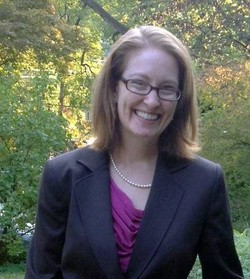Caring for God’s creation is a core tenet of the Presbyterian, if not human, faith. So when a large group of Presbyterians get together, such as at Big Tent 2015, it seems only natural that climate change and caring for the Earth would be topics for discussion. Rebecca Barnes, the Presbyterian Church (U.S.A.) associate for environmental ministries, is leading two workshops that explore Earth stewardship on both the macro and the congregational levels.
“Faithful Living in a Time of Change,” Friday, July 31 at 1:30 p.m., will explore what mission partners around the world are doing within the realm of climate change, and provide guidance to Presbyterians on curbing carbon emissions, advocating for fair climate policies, and pushing for successful talks at the upcoming United Nations climate change conference in December, 2015.
“Earth Care Congregations: Stories and “How-To’s,” July 31 at 3:00 p.m., explores the biblical foundations and practical activities that 165 certified “Earth Care Congregations” have used to start and sustain their Earth Care programs.
Barnes spoke with PNS from her office at PC(USA) headquarters in Louisville, Ky.
Why should any of us, including Presbyterians, be concerned about Earth care?
I believe that caring for God’s creation is actually one of our original human vocations, described in Genesis 2:15, when God said we were to till and keep the garden. And in the book of John, we’re told that God sent Christ out of love for the whole cosmos (Gen 3:16-17). For me, that’s plenty of reason why we can’t separate out our Christian discipleship from an Earth care ethic!
What piqued your interest initially in the Earth care movement?
It was probably my grandmother’s commitment to reusing, conserving and not consuming unnecessary things. Also, my parents always had a backyard garden, took us camping often and saved our bottles to recycle at the fire station long before we had curbside recycling. In my family, caring for others included the natural world around us.
You’re leading two workshops at Big Tent: Faithful Living in a Time of Change and Earth Care Congregations: Stories and “How To’s.” How are they different in terms of content?
The climate change workshop will focus specifically on climate disruption, its impact on the most vulnerable populations in our world, and what we can do about it. The Earth Care Congregations workshop will showcase broader issues being addressed at the local level, including recycling, water use, Vacation Bible School, church gardens, and creative worship.
What do you hope attendees will take away from your Big Tent workshops?
I hope they will take away hope and inspiration, and practical ideas—even in the midst of seriously hard realities and daunting challenges - that our faith-filled action does make a difference! I hope attendees also will connect with one another and use each other (and our Earth Care Congregations across the country) as resources for the journey.
The United Nations COP 21, an important climate change conference sponsored by the UN, is scheduled for this coming December. Do you have expectations – or hopes – from the conference?
I can’t speak broadly about the expectations of the global faith community, or the countries attending the meeting, so I’ll speak to my own hopes for COP 21. This is a crucial year to move forward a global commitment to reduce greenhouse gases and curb climate change. The voluntary commitments made by the huge players, like the US and China, have the ability to create an incredibly significant new agreement; one that we need urgently if we are to change the climate change trajectory that is compounding hunger, poverty, and natural disasters. If we do not feel the Spirit’s movement in the convergence of events—from Pope Francis’ upcoming papal encyclical on the environment, to UN meetings in New York in September, to this conference in Paris—I fear we will have become a very complacent people, unwilling to be moved to meaningful action, even by God’s amazing, ongoing, saving work in the world and God’s invitation for us to become a part of it!
In 2015 we can galvanize for serious change, in the PC(USA), our congregations and individual lives, as well as the world.
Aside from getting involved through their local church’s Earth Care initiative, what are one or two actions an individual can take to create a positive environmental impact?
One important “action” an individual can take is to humbly commit to being, right now and forevermore, “reformed, and always reforming” in relationship with all of God’s creation. This means that we admit to who we are, where we have been, and know we have fallen short. Then, we accept God’s gracious forgiveness, knowing that it is God who is Creator, Redeemer and Sustainer of this world. Finally, we respond through the Spirit, with our grateful, joyful re-commitment.
This means our journey is never-ending, always deepening, and constantly accompanied by Christ. It doesn’t matter whether we start with taking a shorter shower, building a compost bin, writing letters to Congress, signing a pledge on reducing carbon emissions—it matters that we start. Together we will make a huge impact if we just keep moving, deepening, and reforming.

